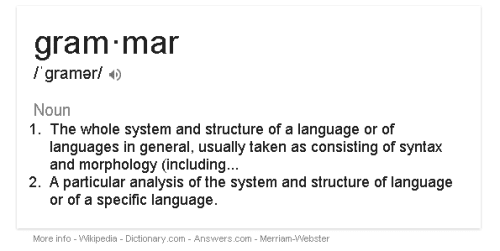While I was waiting for my daughter at the school gate this afternoon, I overheard two mothers, an Indian and a Chinese, having a conversation about Mother Tongue subjects. (Mother Tongue or MT is a term used to refer to the second language in Singapore education.) The Indian lady asked about grammar in the Chinese language. To which the Chinese lady responded in broken English, “No grammar in Chinese. No past or present tense. Only character meaning different. Then put with other character give different meaning.” [“There is no grammar in Chinese. No past or present tenses. Each character is unique and may take a different meaning depending on which character or characters it is combined with.”] The Indian lady nodded, noting that she understood her exactly, “Oh not like English ah! Wah, your Chinese (language) also very difficult.”
In this regard, the Chinese lady was not clear when she refers to grammar as an aspect of language that needs to be learnt in order for it to be correctly used. Lets compare English and Chinese languages.
When your English is poor, it means your grammar is bad. Forget about the vocabulary part. People can forgive you for not knowing the difference between a watch and a clock or a student and a pupil. But they start to notice your English if you mispronounce an English word or use the wrong tense for a plural noun. It is quite sensitive. What if you couldn’t tell time? That would be unthinkable because anyone can count from 1-10. Telling time is child’s play. Your English is poor because your grammar is bad.
But it is incorrect to say that there is no grammar in Chinese. Whenever a word or character is modified by another word or character, a system or structure is being constructed. This construction is the essence of grammar. There is no Chinese grammar textbook per se, but the dictionary itself will demonstrate the meaning of each character and using the stroke as a reference, we can decipher the language group it belongs to. There are also Chinese language guidebooks on nouns, noun phrases and verbs.
You may or may not agree with me on this. If you stop thinking grammar, you can literally speak any language without any care in the world how bad you sound. Only and only when you start to take note of the structure of your sentences will you second guess yourself. “Did I sound right?” If there was no grammar in Chinese, why would there be tests on Chinese writing, oral, comprehension and what not? How you place verbs and nouns in a sentence defines grammar.
Although I wish I had my chance to enter into the ladies’ chat space and comment, I left the scene leaving them smiling at each other for having a moment together. I just hope the Chinese lady realises that she got it wrong.


